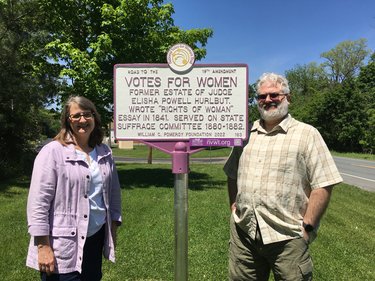Judge Hurlbut honored with historic marker
— Photo from the Bethlehem Historical Association
Susan Leath, Bethlehem town historian, and Chris Philippo, Bethlehem Historical Association trustee, stand with a new historic marker honoring Judge Elisha Powell Hurlbut located at the corner of River and Halter roads in Glenmont, the former drive to Hurlbut’s mansion.
BETHLEHEM — The National Votes for Women Trail goes through Bethlehem.
A marker was recently placed near the site of the long-gone “Glenmont on the Hudson” estate owned by Elisha Powell Hurlbut, originating the name of the modern-day Bethlehem hamlet of Glenmont.
Hurlbut was highly influential in the Woman Suffrage movement. His life and career were researched by Chris Philippo, a trustee of the Bethlehem Historical Association.
Working with Bethlehem Town Historian Susan Leath, Philippo was able to identify the exact location of Hurlbut’s former estate. Philippo then applied to the William C. Pomeroy Foundation for an historic marker grant.
The Pomeroy Foundation has donated 250 markers nationally, working with the National Votes for Women Trail, which has 2,000 sites in its database as it seeks to “tell the untold story of suffrage for all women.”
Philippo documented Hurlbut’s influence in the women’s suffrage movement. His persuasive essay “Rights of Woman” was published in 1841 when he was a young attorney working in New York City.
In 1847, he was appointed as a judge of the New York State Supreme Court. That same year, he married Catherine Van Vechten, a daughter of Teunis Van Vechten and Catherine Gansevoort, both prominent Albany families. The couple would go on to have four children together.
Due to his ill health, Hurlbut and his family moved to the country. The 1860 federal census shows the Hurlbut family living in Bethlehem, just outside of Albany on the River Road.
While living at Glenmont, Hurlbut continued to think and write about the issues of his day, including civil rights, religion, and phrenology. His lifelong interest in women’s suffrage is indicated with his tenure on New York’s State Suffrage Committee from 1880 to 1882, some 40 years after his essay was published.
Hurlbut died in 1889 and is buried at Albany Rural Cemetery.

